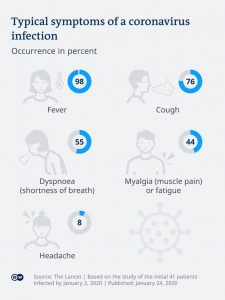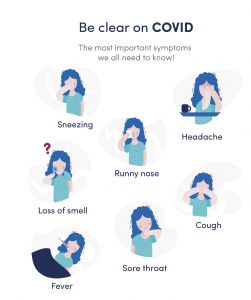COVID-19
General Information

Written by Dr Wolfgang Muller
Written 20/03/2020 – Last major review 20/03/2022 – Last minor review 12/12/2021 – Next mandatory review by Mar 2024
What is COVID-19, Coronavirus and the "Novel Virus"?
COVID-19 is a short form for “Coronavirus Disease 2019” and cased by one of many Coronaviruses some of which have been around for a long time. The Coronavirus causing COVID-19 has not been known before the end of 2019 when a new illness emerged in Wuhan [China] and we call the virus itself SARS-CoV 2 [Severe Acute Respiratory Syndrome Coronavirus TWO]. This is why the virus was initially also called “Novel Virus or 2019 novel coronavirus”. The term ‘Wuhan virus‘ or ‘China virus‘ should not be used as it is widely regarded as wrong to use the name of a place or country in connection of such an illness.
Most of us would have had many infections with previous seasonal Coronaviruses in the past. These infections are generally very mild. However, there are also other Coronaviruses causing very severe illnesses such as the SARS-CoV-1 causing Severe Acute Respiratory Syndrome [SARS] and MERS-CoV causing Middle East Respiratory Syndrome [MERS].
What does the new Coronavirus cause?
SARS-CoV 2 [Severe Acute Respiratory Syndrome Coronavirus TWO] {COVID-19 virus} is causing an illness we are currently calling “Coronavirus Disease 2019”. The name is not very inventive, but it is an entirely new disease. We did not know anything about it until its first outbreak which occurred in the later months of 2019 in a Chinese city called Wuhan. The World Health Organisation [WHO] reportedly heard about it first on 31 December 2019. However, we are learning a lot about it every single day. We also know that there is was no individual person in the world who was immune to this virus. In some way we can apply some of the experience gained from other outbreaks in the past which may help with this new disease.
What are the symptoms of classical COVID-19?

The most reported symptoms are fever {>37.8 ºC = 100F}, a new cough and “loss of smell or taste“.
I have seen many children and adults who had “(extreme) fatigue”, “runny nose”, “abdominal pain“, “diarrhoea“, “rashes“or “chest pain“.
There are many ‘asymptomatic’ cases, which means there are individuals with no or very little symptoms.
Be aware that all the other diseases are still occurring and if you are worried you should talk to a health professional, general practitioner, Paediatrician, physician or NHS 111.
What are the symptoms of new variant COVID-19?

Newer variants and Omicron cause far more often these symptoms.
“Fatigue”, “body aches”, “head ache”, “scratchy throat or sore throat”, “runny nose / sneezing”.
Fever and cough may or may not occur.
Early warning signs can be fatigue and dizziness / fainting.
There are again many ‘asymptomatic’ cases, which means there are individuals with no or very little symptoms.
Previous vaccination reduces the severity of symptoms significantly.
Is Ibuprofen safe to give if you have Coronavirus Disease?
There were initially a lot of news coming out on the internet and social media that Ibuprofen [Nurofen] and related drugs such as Diclofenac [Voltarol] or Naproxen should be avoided in cases of infection with COVID-19. These are drugs belong to a group of Non-Steroidal Anti-inflammatory Drugs [NSAIDs].
Currently the initial concerns of increased risk of more severe symptoms of COVID-19 when Non-Steroidal Anti-inflammatory Drugs [NSAIDs] {like Ibuprofen} are taken have subsequently NOT BEEN confirmed (3).
There was initially confusion whether these warnings were fake news but highly respected medical journals initially also issued warnings:
Articles in highly rate medical journals such as BMJ {British Medical Journal} had also suggested there could be a link but in March 2020 these were only suspicions, case reports and expert opinions(1). There was no conclusive evidence and many had doubted that there is a link(2).
What is a sensible approach for now?
For viral infections in general:
Should I bring the temperature down? This is a good question and many think fever is dangerous and it comes with a risk of febrile convulsions. More and more doctors now believe that nature developed a fever as a body response for a purpose (7). If we reduce the fever our body may find it even harder to do its ‘job’ effectively. If your child has high fever >39°C and you are giving Paracetamol do not expect the temperature to be in the normal range [36.5-37.5°C] as it may still be between 38-39°C. As long as you child is not in discomfort or pain you may leave it at that.
So, what should we do?
In my experience, it is absolutely justifiable not to give Paracetamol or Ibuprofen if the fever is below 39°C as long as the child is not uncomfortable or in pain. We also know that we cannot prevent febrile convulsions with anti-pyretics (fever reducing medications) at the best of times. It is not well understood why, but the risk of a febrile convulsion stays the same with or without regular Paracetamol or Ibuprofen.
However if your child is younger than 4-5 months you should see a doctor on the same day. Equally, you should seek urgent medical advice, if your child is unusually irritable, lethargic or uncomfortable, if your child has a fever over 39.5°C [103F], a fever for 4 days or longer or most importantly if you are worried.
You should avoid overwrapping a febrile child. You may use a tepid sponge bath or a wet flannel on the forehead or the calves. It is important not to use cold water but lukewarm water to moisten the flannels. But remember, a fever does not need to be lowered if it is mild.
I advise to use Paracetamol and add in Ibuprofen if needed if your child has no other reason not to use it:
(1) if your child is uncomfortable and
(2) if the fever is over 39°C [102.2F].
Your doctor may be able to advise if it is safe to give a little bit more Paracetamol than indicated on the bottle for a short while.
If you have given Paracetamol in the correct dose and you child has still a temperature over 39C or is in pain I would advise to give Ibuprofen.
see: Information –> Information for Parents –> Infections –> Acute viral infection: What can I do?
Literature:
(1) Covid-19: ibuprofen should not be used for managing symptoms, say doctors and scientists; BMJ 2020;368:m1086 17 March 2020
(2) Advice about Anti-Inflammatory medication and COVID-19; Health and Safety Executive 16 March 2020
(3) COVID-19 pandemic and therapy with ibuprofen; Naunyn-Schmiedeberg’s Archives of Pharmacology 15 April 2020
